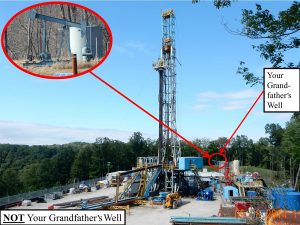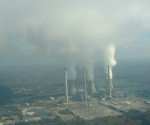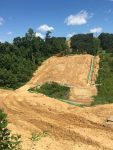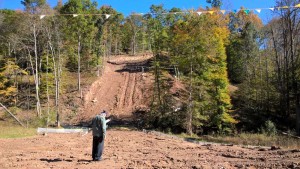- Like
- Digg
- Del
- Tumblr
- VKontakte
- Buffer
- Love This
- Odnoklassniki
- Meneame
- Blogger
- Amazon
- Yahoo Mail
- Gmail
- AOL
- Newsvine
- HackerNews
- Evernote
- MySpace
- Mail.ru
- Viadeo
- Line
- Comments
- Yummly
- SMS
- Viber
- Telegram
- Subscribe
- Skype
- Facebook Messenger
- Kakao
- LiveJournal
- Yammer
- Edgar
- Fintel
- Mix
- Instapaper
- Copy Link
Update: April Keating reports that FERC has informed her that people can make comments to FERC up until the day a pipeline is approved. So, continue piping up! FERC is especially looking for comments during the EIS period, which is the time the agency is trying to identify problems. Pipe up!
In case it’s of use to anyone commenting to FERC on its EIS for the Mountaineer Xpress pipeline project, below are the comments I made last night, at the scoping meeting held in Ripley, WV. There’s another meeting tonight at 6:00 p.m. at the LaBelle Theater, 311 D Street, South Charleston, WV 25303. Get there early to sign up to speak, and to look at the maps and ask questions of FERC and Columbia. You can also make written comments until December 17.
Here’s a disgusting little tidbit I didn’t know going into the meeting last night: FERC chairman rejects overarching review of pipeline projects. It might be good to underscore the need for FERC to conduct a single, comprehensive analysis that would assess the need for and the cumulative environmental impacts of the several major pipeline projects proposed for West Virginia and neighboring states, even if FERC has never done such a thing before and even if FERC’s policy has been to, according to a FERC spokeswoman cited in the article, “allow market forces to influence where projects would be situated.”
 Landowners beware. This is not your grandparents’ oil and gas industry. Do not sign a lease without contacting a knowledgeable lawyer first. Learn from your northern West Virginia neighbors who have already been through this.
Landowners beware. This is not your grandparents’ oil and gas industry. Do not sign a lease without contacting a knowledgeable lawyer first. Learn from your northern West Virginia neighbors who have already been through this.
The onslaught of deep shale hydraulic fracturing – fracking – for methane is transforming West Virginia, and not for the better. Once quiet, rural areas are now industrial zones, where convoys of massive trucks clog and pummel roads and increase accidents, where compressor stations despoil the quiet, where light pollution ruins the night, and where toxic emissions befoul the air and water, sickening gas workers, and nearby community members, livestock and wildlife.
In deciding whether to approve this pipeline, FERC should weigh the fact that it will mean more fracking for our already besieged communities.
For each point made here, FERC should not look at this one project alone, but should examine the cumulative impacts of all the pipelines proposed for West Virginia and surrounding states.
Energy companies tell us more pipelines will mean more national energy security, but it sure looks as though one aim of these pipelines is to facilitate the export of the products of deep shale extraction. FERC should examine whether there really is a “need” for this pipeline, and define what is meant by the word “need” and note whose “needs” are being served. FERC should examine the legal and constitutional ramifications of allowing a for-profit corporation to use eminent domain to seize land, especially when that seizure is conducted under the false banner of “national energy security.”
Whenever a corporation wants to have its way with our land, our air and our water – all of which are our very life support system – then we hear a promise of jobs. We are sick and tired of the false argument these greedy corporations continue to dish out – that we can either have jobs or the environment, but not both. Hogwash. Pipeline jobs do not promise us a future. They only promise profits for the company, at the long-term expense of our communities. FERC should take a good hard look at any promise of jobs the company makes, should examine the company’s record with the health and safety of its workers and should consider whether investing in pipeline infrastructure is delaying or even replacing other potential jobs, such as those in the rapidly growing sector of solar energy, as well as local food growing, local tourism and any potential jobs which will require clean water and clean air as well as healthy workers.
If FERC imagines there is an “economic necessity” for this project, then FERC must evaluate all the ecosystem services and their dollar value that will be eliminated or impacted by the construction, maintenance and operation of this pipeline. Ecosystem services include such services offered by, for instance, intact forests, such as flood control, erosion control, water purification and atmospheric purification. These are real services with extreme economic value, services I feel confident in saying FERC has universally undervalued, if the agency has bothered to consider them at all.
In considering this pipeline, FERC must study the capacity and ability for first responders (often volunteers) and nearby hospitals to respond if/when there is an explosion on the pipeline. Since this pipeline would be transporting explosive materials, FERC must examine the pipeline blast zone radius. Who lives nearby? What would be the effects of an explosion on the land, air, water and humans and other creatures living in the blast zone? FERC must also make certain the public understands how huge the blast zone radius is with pipelines of this diameter.
It is FERC’s duty to fully assess all alternatives to lessen or avoid environmental impacts. The EIS should include a review of alternatives using existing pipelines and existing corridors, as well as the alternative of no pipeline at all.
The pipeline impacts need to be evaluated during all phases of the project, from construction through completion. FERC should evaluate impacts during construction, including the potential use of fly ash for backfill, and cumulative impacts following the completion of the pipeline, such as increased fracking and the impacts to water, wildlife and human health, more radioactive waste in our landfills and increased global warming.
FERC should evaluate whether it is a public necessity to use eminent domain to build an additional pipeline when there are existing pipelines and corridors already in place, especially in light of the fact that pipeline construction would allow for the export of methane.
FERC should examine what implications this pipeline with have in terms of climate change and what it will do to lock West Virginia into continued reliance on fossil fuels, especially in light of the rapid worldwide growth of renewal energy an energy efficiency measures.
In light of the above, FERC should examine the moral issues involved with this pipeline and what allowing its construction would mean for future generations in terms of impacts on the climate and water resources. Further, isn’t it better to leave some gas in the ground for future generations, rather than ship it out overseas as fast as possible, for no need other than the fossil fuel industry’s “need” for more profits?
Compression stations and construction will diminish air quality and have increased noise levels. They impact human health negatively. The proximity of the compressor station and pipeline to communities and nearby residences and how to mitigate adverse effects should be fully evaluated.
Because of the flammability of methane, the pipeline is at risk of an explosion. FERC should consider the blast radius should an explosion occur and how many residences are within the blast radius. Further, they should evaluate mitigation efforts to avoid populated areas. Evaluate the health risks associated with living near a compressor station or a leaking natural gas pipeline. FERC also needs to examine the capacity for local first responders and hospitals to respond should there be (when there is) an explosion along the proposed pipeline’s route.
Constructing this proposed pipeline will increase forest fragmentation, so FERC should evaluate how many acres of forest will be fragmented and the impact on local wildlife.
FERC should inventory rare, threatened and endangered species that rely on habitat in the proposed route. For example, the cerulean warbler’s population has declined dramatically in recent decades and the proposed pipeline’s route could cut swaths through prime habitat for this bird species. FERC should evaluate how the proposed pipeline will impact at-risk species through disturbance, habitat loss, breeding, etc. and how the negative impacts will be mitigated or avoided.
FERC should also evaluate the impacts of increased sedimentation from runoff and loss of topsoil during construction.
WV is known for its outdoor recreational opportunities. FERC should evaluate how the pipeline would impact outdoor recreation and tourism.
The proposed pipeline would cross streams, rivers and wetlands. FERC should evaluate how many crossings will occur, the acres of wetlands to be disturbed and how the pipeline will impact springs and drinking water sources. Impacts to freshwater streams will also affect fisheries resources, which is an important part of the state’s ecology and tourism. With impacts to the hydrology there could be cumulative effects such as flooding, so FERC should evaluate how the construction impacts from disturbing streams and wetlands will impact flood events
WV contains many cultural resources, such as Native American and civil war artifacts; how will the proposed pipeline’s construction impact these cultural resources?
Our state hosts ecologically diverse vegetation which can provide economic benefits such as ginseng and several tree species. FERC should evaluate how the pipeline will impact these and other important vegetation species. West Virginia has diverse wildlife populations from large mammals to small salamanders that play an important role in the ecosystem. FERC should evaluate how the construction will impact West Virginia’s wildlife species including breeding and nesting grounds, migration routes, and increased predation from the proposed pipeline corridor.
Here’s some info that might help in composing your own comments, and here’s how to submit written comments.













